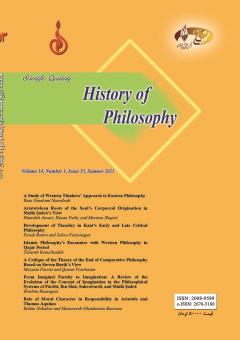A Study of Western Thinkers’ Approach to Eastern Philosophy
Subject Areas : Philosophical roots of Eastern religions
1 - Associate Professor, Philosophy Department, University of Tehran, Farabi Campus, Qom, Iran
Keywords: Eastern philosophy, Western philosophy, comparative philosophy, Chinese philosophy, Japanese philosophy, Europe-centeredness ,
Abstract :
The discussion of the meaning and existence of philosophy in the East is considered to be an introduction to any exchange of thought and agreement between the East and the West. Ritchie, the Christian missionary, wrote a book entitled Confucius: The Chinese Philosopher and introduced his thoughts to the West for the first time. Later and under his influence, Leibniz and Christian Wolf not only acknowledged the certain existence of philosophy in the East, particularly in China, but also believed that it could be used to remove the existing problems in Western philosophy and theology. However, Kant initiated a racist approach in this regard that dealt with other philosophies from a higher position and questioned the very essence of philosophy in the East altogether. This Europe-centered view entered a new era in the West with Hegel, whose view of eastern philosophy was humiliating and hierarchical. Unlike him, Deussen, Schopenhauer, Nietzsche, Husserl, Wittgenstein, Heidegger, and many other Western thinkers benefitted from the vast philosophy of the East. Generally speaking, it can be said that denying or doubting the legitimacy of Eastern philosophy on the part of some Westerners lacks logical support and is mainly rooted in their nationalist feelings. The reaction of Eastern thinkers in this regard is also noteworthy. Some of them complain that Western philosophers do not appreciate Eastern philosophy as much as it truly deserves and do not use it in order to solve the crises that contemporary Man encounters. However, some others, in line with Westerners but with a different motive, refuse to apply the word philosophy to their ancient legacy in order to protect its originality and safeguard against its mixture with Western philosophy.
ارسطو (1378) متافیزیک، ترجمۀ محمدحسن لطفی، تهران: طرح نو.
ادواردز، پل (1375) فلسفه تاریخ: مجموعه مقالات از دایرةالمعارف فلسفه، ترجمۀ بهزاد سالکی، تهران: پژوهشگاه علوم انسانی و مطالعات فرهنگی.
ایزوتسو، توشیهیکو (1384) آفرینش، وجود و زمان، ترجمۀ مهدی سررشتهداری، تهران: مهر اندیش.
سعید، ادوارد (1386) شرقشناسی، ترجمۀ لطفعلی خنجی، تهران: امیرکبیر.
رورتی، ریچارد (1390) فلسفه و آینه طبیعت، ترجمۀ مرتضی نوری، تهران: نشر مرکز.
ژیلسون، اتین (1385) هستی در اندیشه فیلسوفان، ترجمۀ سیدحمید طالبزاده و محمدرضا شمشیری، تهران: حکمت.
کربن، هانری (1369) فلسفه ایرانی، فلسفه تطبیقی، ترجمۀ سیدجواد طباطبایی، تهران: توس.
گودرزی، مرتضی (1393) هیدگر و حکمت دائویی، تهران: علمی.
یوـلان، فانگ (1400) تاریخ فلسفۀ چین، ترجمۀ فرید جواهرکلام، تهران: فرزان روز.
ناکامورا، هاجیمه (1378) شیوههای تفکر ملل شرق، ترجمه مصطفی عقیلی و حسین کیانی، تهران: حکمت.
Defoort, C. (2006). Is “chinese philosophy” a proper name? a response to Rein Raud. Philosophy East and West, vol. 56, no. 4, pp. 625-660.
Dijkstra, T. (2020). A Chinese philosopher in European dress: the review of the first Latin translation of Confucius (1687) in the Philosophical Transactions and Its Preoccupation with Chinese Chronology. Foreign devils and philosophers. Ed. by T. Weststeijn. pp. 205-224. Leiden: Brill.
Heidegger, M. (1959). On the way to language. trans. by P. Hertz. New York: Harper and Row publishers.
James, G. C. M. (1993). stolen Legacy: Greek philosophy is stolen Egyption philosophy. Africa World press.
Kasulis, T. (2019). Japanese philosophy. Stanford encyclopedia of philosophy. https://plato.stanford.edu/entries/japanese-philosophy/.
Kimmerle, H. (2016). Hegel’s Eurocentric concept of philosophy. Confluence: Journal of World Philosophies, no. 1;
https://scholarworks.iu.edu/iupjournals/index.php/confluence/article/view/524
Liu, J. (2016). The problem of philosophy in classical Chinese thought: the text Zhuāngzǐ as case study. A thesis submitted in partial fulfillment of the requirements for the degree of Master of Arts, University of Washington.
Mall, R. A. (2000). The concept of an intercultural philosophy. translated from the German by M. Kimmel. Polylog: Forum for intercultural philosophy.
Mark, E. (2016). Similarities between eastern & western philosophy. World History Encyclopedia. https://www.worldhistory.org/article/855/similarities-between-eastern--western-philosophy
Masson-Oursel, P. (1926). Comparative philosophy. trans. by V. C. C. Collum. London: Kegan. Paul Trench Trubner Coltd.
Mills, L. H. (2010). Zoroaster, Philo and Israel, being a treatise upon the antiquity of the Avesta. . Nabu press.
Nakamura, H. (1988). The meaning of terms “philosophy” and “religion” in various traditions. In James, book, Interpreting across Boundaries: new essays in comparative philosophy. From the Princeton university press. pp. 127-151.
Norden, B. W. Van (2017). Taking back philosophy: a multicultural Manifesto. New York: Columbia university press.
Park, P. K. J. (2014). Africa, Asia, and the history of philosophy: racism in the formation of the philosophical canon, 1780–1830. State university of New York press.
Rigsby, C. A. (2010). Nishida on Heidegger. Continental philosophy review, vol. 42, no. 4, pp. 511-553.
Rorty, R. (1989). Review book: Interpreting across boundaries: new essays in comparative philosophy by G. James and E. Deutsch, 1988. Princeton university press. Philosophy East and West, vol. 39, no. 3, pp. 332-337.
Ryden, E. (2013). Copleston and Chinese philosophy. Heythrop Journal, vol. 54, no. 2, pp. 424-434.
Segovia, F. (2000). Interpreting beyond borders. Sheffield academic press.
Tartaglia, J. (2014). Rorty's thesis of the cultural specificity of philosophy. Philosophy east and west, vol. 64, no. 4, pp.1018-1038 .
Teng, S. (1957). The predispositions of Westerners in treating Chinese history and civilization. The Historian. vol. 19, no. 3, pp. 307-327.


